The Ultimate Guide to Breakfast Cereal Making Machine in 2024
Introduction
The breakfast cereal industry has seen substantial growth and innovation over the past few decades. In 2024, the role of breakfast cereal making machines is more critical than ever in meeting the demands of a dynamic market. These machines are pivotal in ensuring efficient, consistent, and high-quality cereal production, making them indispensable in modern food manufacturing.
Understanding the importance of these machines involves delving into their history, technological advancements, and the specific features that make them essential for today's cereal producers. The breakfast cereal making machine is designed to streamline the production process, enhance product quality, and ensure compliance with stringent food safety standards.
This guide aims to provide a comprehensive overview of the evolution, types, key features, and future trends of breakfast cereal making machines. By understanding these aspects, manufacturers can make informed decisions about investing in the right equipment to stay competitive in the market.
The technological advancements in these machines, including automation and smart technology, have revolutionized cereal production. These innovations not only increase efficiency but also improve the precision and consistency of the final product. Moreover, the integration of sustainable practices in machine design reflects the industry's commitment to environmental responsibility.
Choosing the right breakfast cereal making machine involves considering various factors such as production volume, budget, and specific production needs. This guide will provide insights into selecting the most suitable machines, comparing different brands and models, and understanding the customization options available.
As we look ahead, the future of breakfast cereal making machines promises further advancements, particularly in terms of sustainability and smart technology integration. Staying informed about these trends will help manufacturers adapt and thrive in an ever-evolving market.
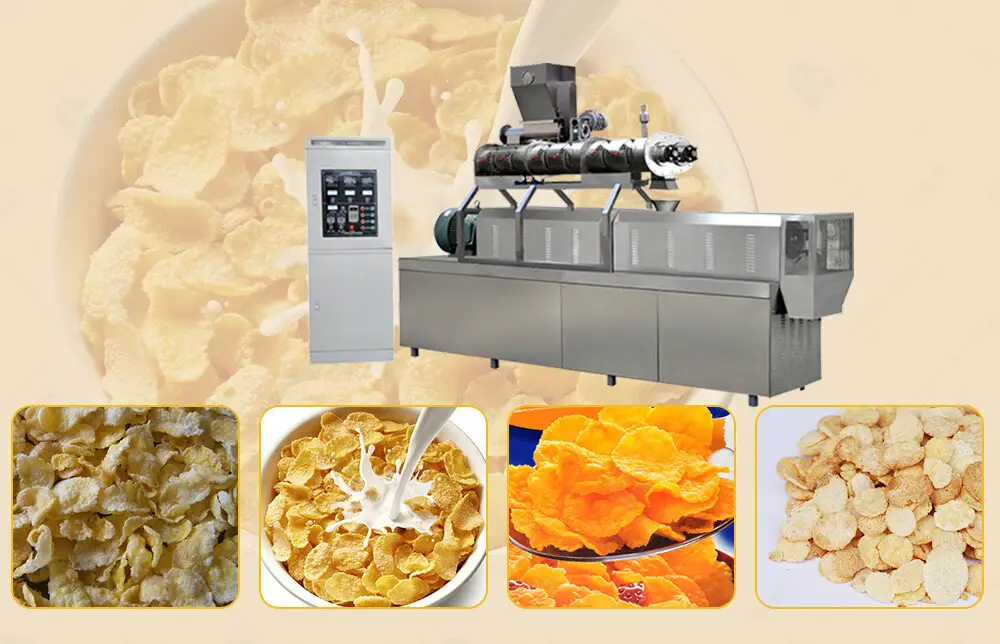
Types of Breakfast Cereal Making Machines
Understanding the different types of breakfast cereal making machines is crucial for optimizing production processes and ensuring product quality. Each machine type serves a specific function in the cereal production line, contributing to the efficiency and consistency of the final product. Here are the primary types of machines used in the industry:
Extruders
Extruders are a fundamental component in the production of breakfast cereals. They mix, cook, and shape the cereal dough into various forms, such as flakes, rings, and puffs. Modern extruders are equipped with advanced controls that allow precise adjustments to temperature, pressure, and moisture, ensuring uniformity in texture and flavor. The versatility of extruders makes them essential for producing a wide range of cereal types, from traditional cornflakes to innovative multi-grain blends.
Flaking Machines
Flaking machines play a vital role in producing cereals like cornflakes and bran flakes. These machines flatten cooked cereal dough into thin, uniform flakes. The flaking process involves rolling the dough between large, heavy rollers under controlled pressure. The precision of flaking machines ensures consistent thickness and texture, which are critical for achieving the desired mouthfeel and crunchiness of the cereal.
Coating and Drying Machines
Coating and drying machines are used to add flavorings, sweeteners, and vitamins to cereals. The coating process involves spraying a liquid mixture onto the cereal pieces, which are then dried to achieve a stable, shelf-ready product. Advanced coating machines offer precise control over the application process, ensuring even distribution and adherence of the coating. Efficient drying systems are crucial to maintain the cereal's crispiness and prevent spoilage.
Packaging Machines
Packaging machines are essential for preserving the freshness and quality of breakfast cereals. These machines are designed to fill, seal, and label cereal boxes or bags with high precision. Modern packaging machines often feature automated systems that enhance speed and accuracy, reducing labor costs and minimizing the risk of contamination. Sustainable packaging options are also increasingly integrated, reflecting the industry's commitment to environmental responsibility.
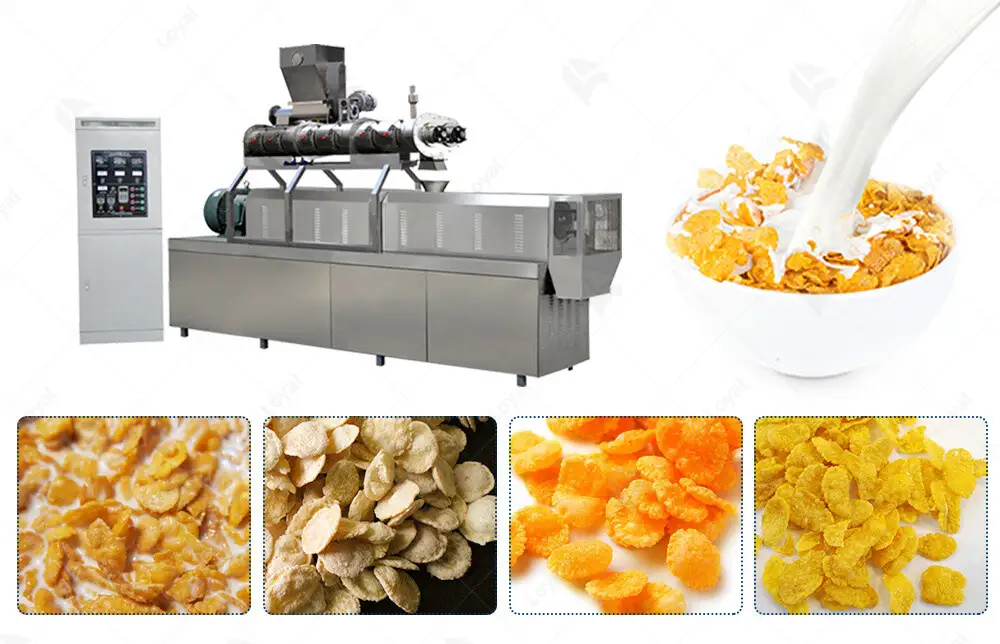
Key Features of Modern Cereal Making Machines
Feature | Description |
| Automation and Efficiency | Advanced automation systems enable continuous and high-speed production with minimal human intervention. This reduces labor costs and increases overall productivity. |
| Precision and Consistency | Modern machines offer precise control over parameters such as temperature, pressure, and mixing time, ensuring uniformity in product texture and flavor. |
| Energy Efficiency | Energy-saving technologies reduce power consumption, lower operational costs, and contribute to sustainable production practices. |
| Hygiene and Safety Standards | Machines are designed with easy-to-clean surfaces and built-in safety features to comply with food safety regulations and minimize contamination risks. |
| Smart Technology Integration | IoT and AI integration allow for real-time monitoring, data collection, and predictive maintenance, optimizing machine performance and reducing downtime. |
| Customization Options | Machines can be customized to meet specific production needs, such as different cereal shapes, sizes, and ingredient combinations, providing flexibility to manufacturers. |
| Sustainable Materials | Use of eco-friendly materials and designs that reduce waste, reflecting a commitment to environmental sustainability. |
| Advanced Control Systems | Touchscreen interfaces and programmable logic controllers (PLCs) enable easy operation and precise control over the production process. |

Key Components of Modern Cereal Making Machines
Modern breakfast cereal making machines are complex systems comprised of various key components that work together to produce high-quality cereals efficiently. Understanding these components is essential for optimizing production and ensuring the consistent quality of the final product.
1. Mixing System
The mixing system is the first critical component of a breakfast cereal making machine. It blends raw ingredients, such as grains, sweeteners, and additives, into a homogenous mixture. Advanced mixers ensure even distribution of ingredients, which is crucial for maintaining the desired flavor and texture.
2. Extrusion Unit
The extrusion unit is where the mixed dough is cooked and shaped. This component uses high pressure and temperature to cook the dough, which is then forced through a die to create various cereal shapes. The precision of the extrusion process directly impacts the consistency and quality of the cereal pieces.
3. Flaking Rollers
For cereals like cornflakes, the flaking rollers flatten the cooked dough into thin flakes. These rollers are designed to apply consistent pressure, ensuring uniform thickness and texture across all flakes. The quality of the rollers determines the final product's crunchiness and mouthfeel.
4. Drying Oven
The drying oven removes moisture from the cereal pieces after extrusion and flaking. Proper drying is essential to achieve the desired crunchiness and extend the shelf life of the cereal. Modern ovens offer precise temperature control and efficient drying processes, reducing energy consumption.
5. Coating Drum
The coating drum applies flavorings, sweeteners, and vitamins to the dried cereal pieces. This component ensures even coating and enhances the taste and nutritional value of the cereal. Advanced coating drums are designed to handle various coating types, from sugar solutions to powdered flavors.
6. Cooling Conveyor
After coating, the cereal pieces need to be cooled to stabilize their structure and prevent sticking. The cooling conveyor gently transports the cereal through a cooling zone, ensuring it reaches the appropriate temperature before packaging. This component is crucial for maintaining product quality.
7. Packaging Machine
The final component in the breakfast cereal making machine is the packaging machine. It accurately fills, seals, and labels the cereal packages, ensuring they are ready for distribution. Modern packaging machines incorporate automation and sustainability features, such as using eco-friendly materials and minimizing waste.
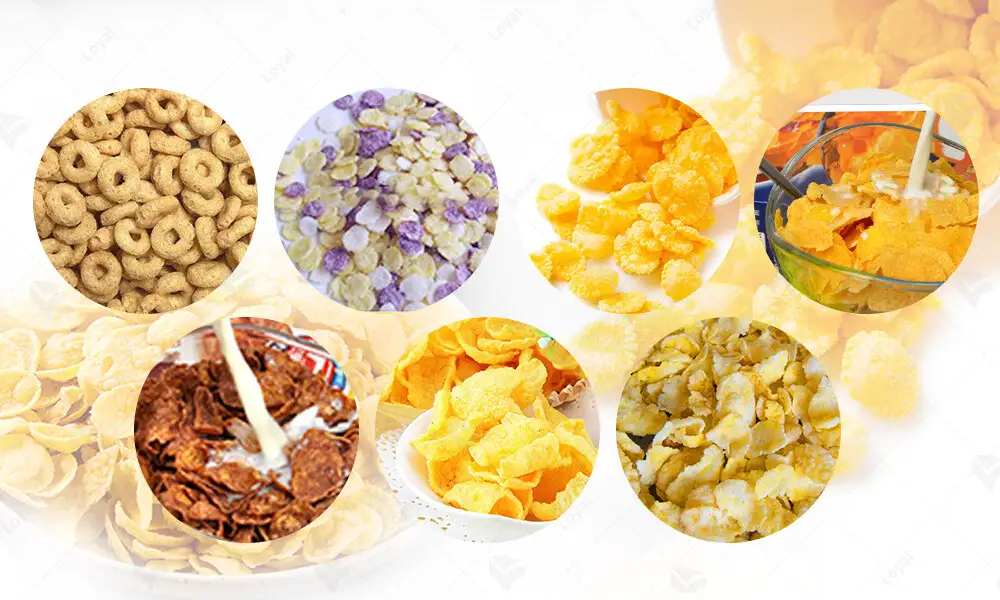
Advanced Features and Technologies
Modern breakfast cereal making machines are equipped with a range of advanced features and technologies designed to enhance efficiency, quality, and sustainability in cereal production. Here, we explore some of the key advancements that set these machines apart in 2024.
Automation and Efficiency
Automation is a cornerstone of modern cereal making machines. Advanced automation systems reduce the need for human intervention, allowing for continuous, high-speed production. This not only increases productivity but also minimizes errors, ensuring consistent product quality. Features such as automated ingredient feeding, mixing, and extrusion streamline the entire production process.
Precision and Consistency
Achieving uniformity in cereal products is critical, and modern machines excel in precision and consistency. With precise control over parameters like temperature, pressure, and mixing time, these machines ensure that each batch of cereal meets the exact specifications. This consistency is crucial for maintaining the desired texture, flavor, and appearance of the final product.
Energy Efficiency
Energy consumption is a significant concern in food manufacturing. Modern breakfast cereal making machines incorporate energy-efficient technologies that reduce power usage without compromising performance. Features such as improved insulation, energy recovery systems, and optimized heating elements help lower operational costs and support sustainable production practices.
Hygiene and Safety Standards
Maintaining high hygiene and safety standards is paramount in food production. Advanced cereal making machines are designed with easy-to-clean surfaces and built-in safety features. These include stainless steel construction, seamless welds, and automated cleaning systems that reduce the risk of contamination and ensure compliance with stringent food safety regulations.
Smart Technology Integration
The integration of smart technology and the Internet of Things (IoT) has revolutionized cereal production. Modern machines come with IoT capabilities that allow for real-time monitoring, data collection, and predictive maintenance. This technology enables manufacturers to track performance metrics, identify potential issues before they cause downtime, and optimize overall machine efficiency.
Customization Options
Every cereal manufacturer has unique production needs, and modern machines offer extensive customization options. Manufacturers can choose from a variety of machine configurations, including different cereal shapes, sizes, and ingredient combinations. This flexibility allows for the production of a wide range of cereal products, from traditional cornflakes to innovative, health-focused cereals.
Sustainable Materials
In line with growing environmental awareness, many modern cereal making machines are constructed using sustainable materials. These include eco-friendly components that reduce the environmental impact of production. Additionally, machines are designed to minimize waste, supporting manufacturers' sustainability goals.
Advanced Control Systems
State-of-the-art control systems are a hallmark of modern cereal making machines. These systems feature user-friendly interfaces, such as touchscreens and programmable logic controllers (PLCs), that allow operators to easily adjust and monitor production parameters. Advanced control systems enhance operational precision and efficiency.
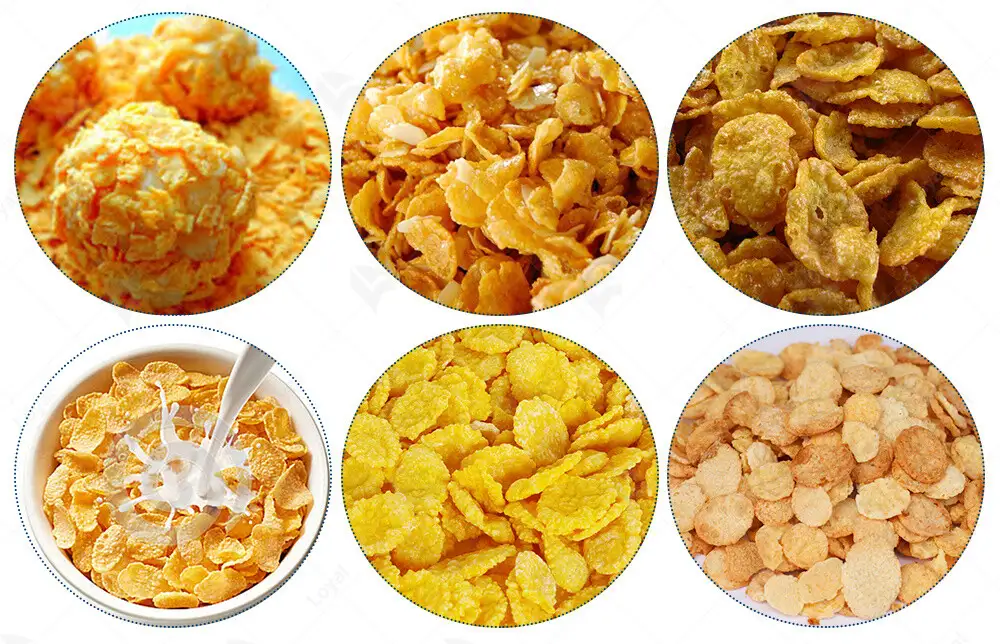
Selecting the Right Cereal Making Machine
Choosing the right breakfast cereal making machine is crucial for ensuring efficient production, high-quality products, and optimal return on investment. Here are the key factors to consider when selecting the ideal machine for your cereal manufacturing needs:
Production Volume
The first consideration is the production volume. It's essential to choose a machine that can handle your required output without compromising on quality. Assess your current and projected production needs to ensure the machine can scale accordingly.
Space and Layout
Evaluate the available space in your facility. Breakfast cereal making machines come in various sizes and configurations. Ensure the machine fits well within your production area and allows for smooth workflow and maintenance access.
Budget
Budget is a critical factor. While it may be tempting to go for the cheapest option, investing in a high-quality machine can save money in the long run by reducing downtime and maintenance costs. Balance your budget with the machine's features and long-term benefits.
Customization Options
Look for machines that offer customization options. Depending on the types of cereals you produce, you might need specific features like different die sizes for extrusion, coating systems, or drying methods. Customizable machines can adapt to changing production requirements and market trends.
Brand and Model Comparison
Research and compare different brands and models. Consider factors such as the manufacturer's reputation, the machine's reliability, and user reviews. Well-established brands often provide better support, spare parts availability, and warranty options.
Maintenance and Support
Maintenance and support are vital for the longevity and efficiency of your breakfast cereal making machine. Choose a machine from a manufacturer that offers comprehensive maintenance services, easy access to spare parts, and responsive technical support.
Energy Efficiency
Energy-efficient machines reduce operational costs and support sustainability goals. Look for features like optimized heating elements, energy recovery systems, and automated shutdown capabilities to minimize energy consumption.
Safety and Compliance
Ensure the machine meets all relevant safety standards and regulations. Features like easy-to-clean surfaces, automatic shut-offs, and safety guards are essential for maintaining a safe production environment and complying with food safety regulations.
Future-Proofing
Consider the future needs of your production line. Technologies such as IoT and smart automation can offer long-term benefits by enhancing efficiency, enabling predictive maintenance, and providing valuable production data insights.
Trial Runs and Demonstrations
Whenever possible, request trial runs or demonstrations of the machines. This hands-on experience can provide valuable insights into the machine's performance, ease of use, and suitability for your specific needs.
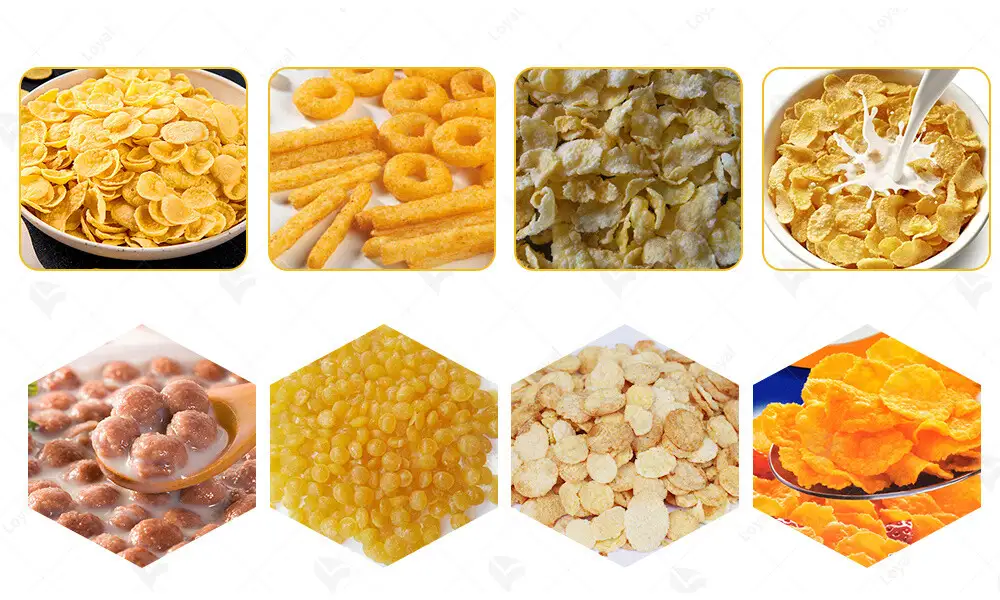
Maintenance and Troubleshooting
Proper maintenance and troubleshooting are essential for ensuring the longevity and optimal performance of a breakfast cereal making machine. Regular upkeep minimizes downtime, maintains product quality, and maximizes the return on investment. Here are some key aspects of maintaining and troubleshooting these machines:
Regular Maintenance Practices
1. Scheduled Inspections: Conduct regular inspections to check for wear and tear on components such as mixers, extruders, and rollers. This helps in early detection of potential issues.
2. Cleaning: Maintain hygiene standards by regularly cleaning all parts of the breakfast cereal making machine. Use food-grade cleaning agents to prevent contamination.
3. Lubrication: Ensure all moving parts are adequately lubricated to reduce friction and prevent mechanical failures. Follow the manufacturer’s recommendations for lubrication intervals and types.
4. Calibration: Regularly calibrate sensors and control systems to maintain precision in the production process. Accurate calibration ensures consistent product quality and efficient machine performance.
5. Replacement of Worn Parts: Timely replacement of worn-out parts such as belts, seals, and bearings is crucial. Keeping a stock of essential spare parts can prevent prolonged downtime.
Troubleshooting Common Issues
1. Inconsistent Product Quality: If the cereal product is inconsistent in texture or flavor, check the calibration of the machine and the quality of raw materials. Ensure that the mixing and extrusion processes are operating within specified parameters.
2. Machine Jams: Jams can occur due to excessive material buildup or foreign objects. Regular cleaning and inspection can prevent jams. If a jam occurs, safely remove the blockage and inspect for any damage before restarting the machine.
3. Temperature Fluctuations: Inconsistent temperatures in the extrusion or drying process can affect product quality. Check the heating elements and temperature control systems. Replace faulty components as needed.
4. Unusual Noises: Unusual noises can indicate mechanical issues such as loose parts or inadequate lubrication. Inspect the machine to identify the source of the noise and address it promptly.
5. Electrical Issues: Electrical problems can cause the machine to stop or malfunction. Regularly inspect electrical connections and components. Ensure that the machine is properly grounded and protected against power surges.
Preventive Measures
1. Training: Ensure that all operators are adequately trained in both operation and maintenance of the breakfast cereal making machine. Proper training reduces the likelihood of operator errors and enhances safety.
2. Maintenance Logs: Keep detailed maintenance logs to track all inspections, cleanings, and repairs. This helps in identifying recurring issues and planning preventive maintenance.
3. Manufacturer Support: Utilize manufacturer support and services for complex troubleshooting and repairs. Many manufacturers offer maintenance contracts and technical support to assist with any issues.
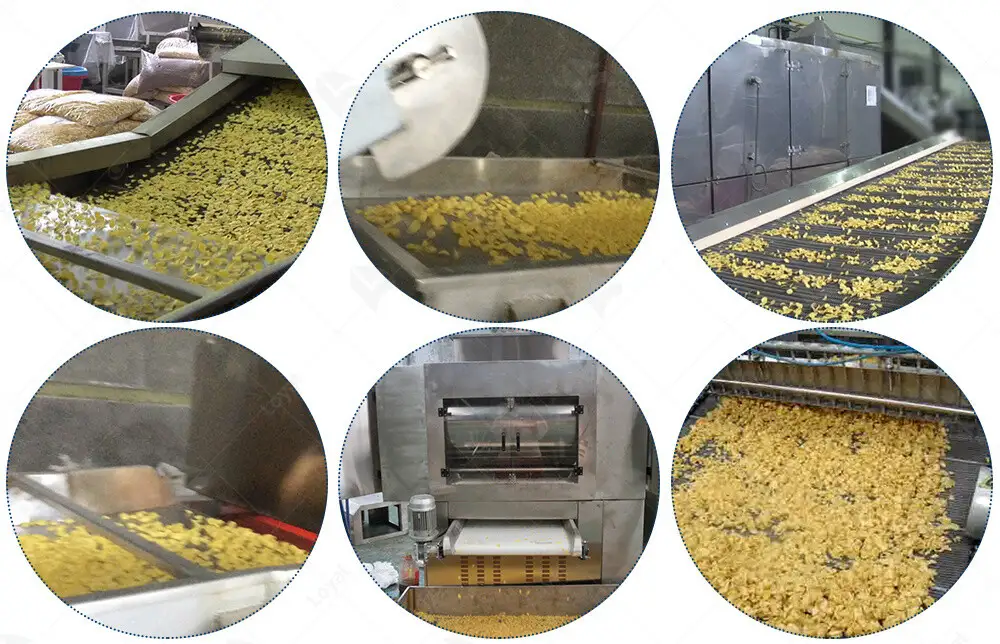
References
Here are five authoritative literature websites about industrial corn flakes making machines:
1.ScienceDirect
Website: [https://www.sciencedirect.com/]
2.IEEE Xplore
Website: [https://ieeexplore.ieee.org/Xplore/home.jsp]
3.SpringerLink
Website: [https://link.springer.com/]
4.Wiley Online Library
Website: [https://onlinelibrary.wiley.com/]
5.ResearchGate
Website: [https://www.researchgate.net/]












